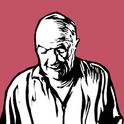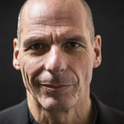“It’s a beautiful time to be alive. A joy to be alive,” Jeff Koons says. Recently turned 70, Koons has the symmetrical features, smooth skin and discreetly expensive overcoat that suggests Mayfair banker, while his conversation hovers around the beatific. He is relentlessly gracious as an interviewee, plying me with water and coffee.
Reflections: Picasso/Koons at the Alhambra, showing until March in Granada, is the first of a series of Andalusian exhibitions showing contemporary artists alongside Picasso. Inside a Renaissance palace, Picasso’s sculpture Head of a Warrior (1933) and canvas The Three Graces (1923) are shown with two works from Koons’s “Gazing Ball” series, in which mirrored spheres are combined with his copies of artworks from the art history canon—here an antique sculpture of a standing woman and a 1799 painting by Jacques-Louis David. Downstairs in the courtyard is Koons’s kitsch yet surprisingly sexy version of The Three Graces (2016–22). Three life-size nudes clasp a garland, their steel surfaces liquid and undulating. While gazing balls can offer the ultimate art selfie, allowing you to admire yourself admiring culture, Koons has a different take; “I don’t think people seeing their reflection is narcissism. These pieces reflect every moment. They reflect every viewer, who hopefully will realise that the experience is in them. To be reflective is to go a philosophical path.”
So what would Picasso say about the exhibition? “I believe Picasso would enjoy the celebration and situation his works are placed in,” he says. “These works take you to a vast dialogue of life, death—change, adaptation, joy—everything is there. Time and space bend in the Picasso/Koons show in Alhambra.” He isn’t shy of referencing himself in the third person; three times during our conversation he refers to the “Picasso/Koons Alhambra Show”. The pairing certainly casts a mutual glow: Koons is the most expensive living artist, Picasso the highest-grossing. The show has been organised in collaboration with the Spanish artist’s grandson Bernard Ruiz-Picasso and his wife, Almine, an art dealer whose gallery has previously sold Koons’s work.
From his highly sexualised series with ex-wife and porn star La Cicciona to levitating basketballs and gleaming metal balloon dogs (which he tried and failed to patent), Koons’s works have always been ambitious. In early 2024, he launched a lunar NFT project, which included a group of 125 mini-sculptures of the moon in various phases installed on the moon’s surface. Not everything has been realised, including Koons’s plans for a 70-foot replica of a 1943 steam locomotive hanging from a real 160-foot crane. I ask Koons how he generates ideas. “Everything resonates,” he says. He gestures to the water glass on the table. “You could be thinking about this water here, and the reflection you might see. The deeper you go, the more it will open up. It doesn’t matter where you find meaning, but find something that sustains you. Everything is abundant.”
He has been frustrated by suggestions that his art was partly driven by a desire to make a lot of money. “The value in art is in how we transcend. It’s a joy. But that got misrepresented and connected to financial aspects which had nothing to do with my intentions.” (Perhaps these misconceptions could be traced to Koons’s early career as a commodities trader.)
Koons will soon be travelling with his wife and six younger children to Venice, Prague and Vienna. What is he most looking forward to? “The Tintorettos and Titians, as well as the Venetian synagogues. And Prague will be new.”
I ask what he’d like to achieve next. “Only to open myself up further,” he tells me. “Walking out of Plato’s cave is through acceptance. It’s through the removal of any anxiety and letting the world, the environment, everything, affect your being and transcending. I try to practice total acceptance. Everything is perfect.’
And how would he feel if the world ended tomorrow? “I would feel complete, that I participated in the life-cycle at this moment,” says Koons with a smile.













